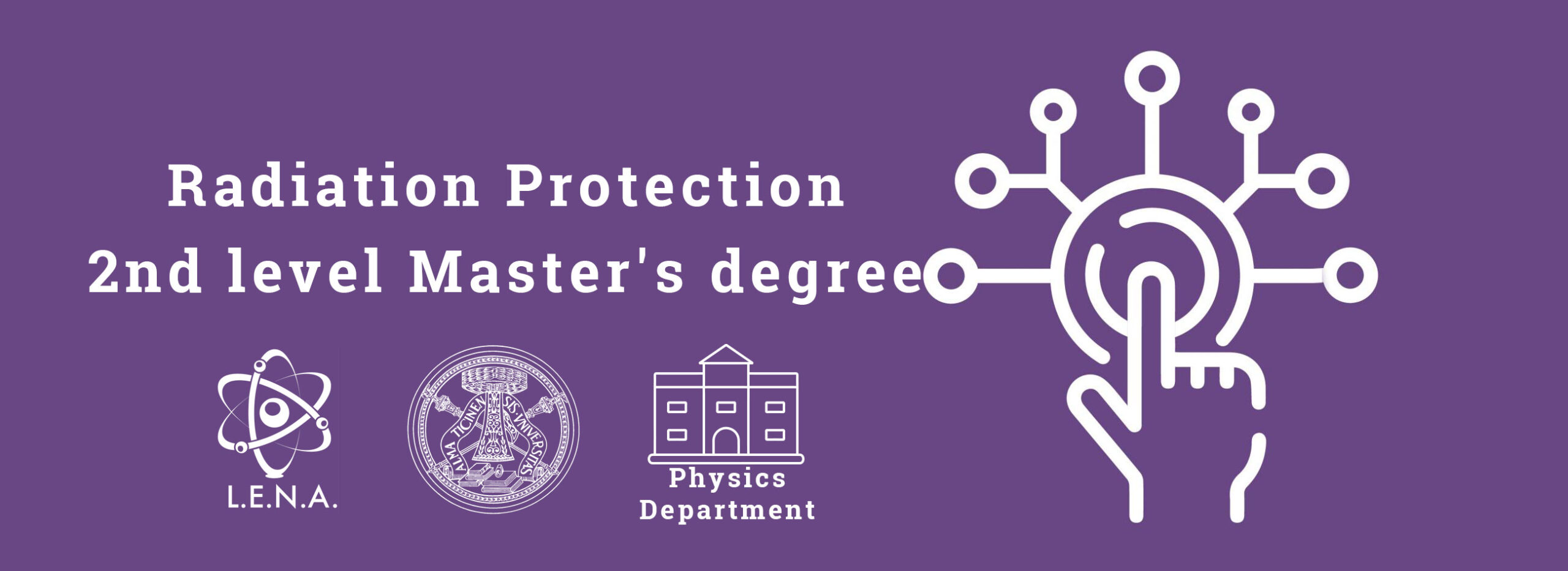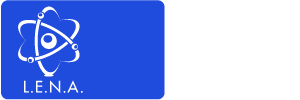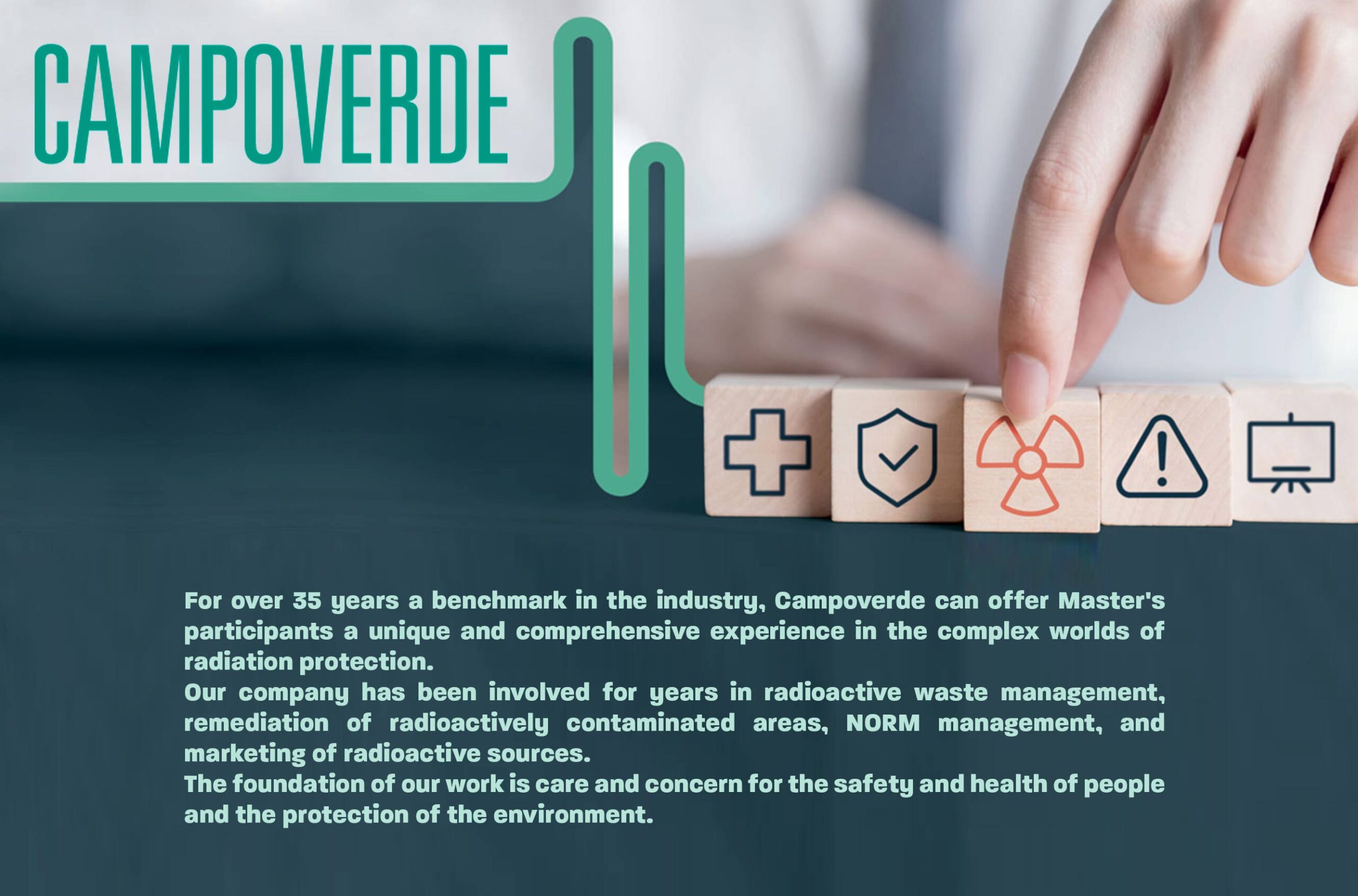
The Master's Degree
The Master’s degree aims to provide participants with the acquisition and enhancement of knowledge and skills essential for passing the examination for inclusion in the third grade of the list of radiation protection experts
(https://www.lavoro.gov.it/temi-e-priorita/salute-e-sicurezza/focus-on/Esperti-qualificati/Pagine/default.aspx).
The professional figure trained in the Master can find an outlet in public and private facilities in the health sector, industry, waste management and in general in activities involving the use of radiogenic machines, radioactive sources and nuclear materials subject to the application of the Italian radiation protection regulations Legislative Decree 101/2020 and the directives
Entry Requirements
The Master’s degree is open to those who have obtained a Master’s degree in accordance with Ministerial Decree 270/04, in one of the following classes:
Class of master’s degrees in Physics
Class of master’s degrees in Aerospace and Astronautical Engineering
Class of master’s degrees in Biomedical Engineering
Class of master’s degrees in Chemical Engineering
Class of master’s degrees in Civil Engineering
Class of master’s degrees in Building Systems Engineering
Class of master’s degrees in Safety Engineering
Class of master’s degrees in automation engineering
Class of master’s degrees in Telecommunications Engineering
Class of master’s degrees in Electrical Engineering
Class of master’s degrees in Electrical Engineering
Class of master’s degrees in Energy and Nuclear Engineering
Class of master’s degrees in Management Engineering
Class of master’s degrees in Computer Engineering
Class of master’s degrees in Mechanical Engineering
Class of master’s degrees in Naval Engineering
Class of master’s degrees in Environmental and Territorial Engineering
Class of master’s degrees in Materials Science and Engineering
Class of master’s degrees in Chemical Sciences
Class of master’s degrees in Industrial chemical science and technology
Materials Engineering
(1020) Class of advanced degrees in physics
(1025) Class of advanced degrees in aerospace and astronautical engineering
(1026) Class of advanced degrees in biomedical engineering
(1027) Class of advanced degrees in chemical engineering
(1028) Class of advanced degrees in civil engineering
(1029) Class of advanced degrees in automation engineering
(1030) Class of advanced degrees in telecommunications engineering
(1031) Class of advanced degrees in electrical engineering
(1032) Class of advanced degrees in electrical engineering
(1033) Class of advanced degrees in energy and nuclear engineering
(1034) Class of advanced degrees in engineering management
(1035) Class of advanced degrees in computer engineering
(1036) Class of advanced degrees in mechanical engineering
(1037) Class of advanced degrees in marine engineering
(1038) Class of bachelor’s degrees in environmental and territorial engineering
(1061) Class of advanced degrees in materials science and engineering
(1062) Class of bachelor’s degrees in chemical science
(1081) Class of advanced degrees in industrial chemical science and technology
Bachelor’s degree obtained under the former regulations in:
Astronomy;
Chemistry;
Physics;
Aerospace engineering;
Medical engineering;
Biomedical engineering;
Chemical engineering;
Civil engineering;
Telecommunications engineering;
Construction engineering;
Electrical engineering;
Electrical engineering;
Environmental and land use engineering;
Nuclear engineering;
Engineering management;
Computer engineering;
Industrial engineering;
Mechanical engineering;
Naval engineering;
Materials science;
Materials Engineering.
Qualifications not previously listed but eligible to apply for the examination for inclusion on the appointed list of Radiation Protection Experts.Community, including Directive 2013/59/Euratom, are also eligible.
Program of study
Classes will be taught mainly in English, except for those related to Italian legislation, which will be taught in Italian. As stated in the current class schedule (more details available in the section: Class Schedule), seven weeks of classes are planned between January and February 2024 in a blended mode, namely: week 1 and 2 in-person, week 3 and 4 online, week 5 in-person, week 6 and 7 online. The total number of hours of classes amounts to 240 hours. The final examination involves the writing and discussion of a thesis on a topic agreed upon with the Master’s Coordinator. Sessions for said discussion will begin in November 2024 and end by April 2025
The Course is divided into 11 modules:
– Nuclear and Atomic Physics;
– Basic Radiobiology;
– Quality Assurance;
– Radiogenic apparatus and sources;
– Dosimetry;
– Risk assessment, occupational safety and prevention/protection;
– Regulatory framework and guidelines;
– Emergencies;
– Waste and transportation;
– Operation of radiogenic and accelerator facilities;
– Nuclear facilities.
What you will become
The objective of the Master is to train highly professionalized figures who can work in public and private facilities in the health sector, industry, waste management and in general in activities involving the use of radiogenic machines, radioactive sources and nuclear materials subject to the application of the Italian radiation protection regulations Legislative Decree 101/2020 and EU directives, including Directive 2013/59/Euratom.
The radiation protection expert is the person, appointed by the employer or the operator, who possesses the necessary knowledge, training and experience for the requirements of 130 Legislative Decree 101/2020 for the exercise of physical surveillance of the exposed worker and controlled areas.
Class schedule
Preliminary calendar
—-
Lecture modules
—-
Preliminary Lecturer Calendar
Internship
The practical traineeship with a minimum duration of 60 working days, as per Art. 129 Legislative Decree 1010/2020 as amended and supplemented, is organized with the cooperation of Research Centers, Agencies and leading Companies in the field including the JRC Commission EU, MIT Ambiente, Capoverde
Board of lecturers
Prof. Saverio Altieri
Prof. Giorgio Baiocco
Prof.ssa Francesca Ballarini
Prof.ssa Nicoletta Protti – Coordinator
Dr. Andrea Salvini
The Teachers’ Board, determines the allocation of teaching duties and elects from among the faculty of the University of Pavia the Coordinator of the Master’s program.
Advisory Board
As provided for under Paragraph 3, Art. 4 of the University of Pavia Master’s Regulations, a Steering Committee, or Advisory Board, composed of university professors and representatives of the productive categories and participating institutions is established in order to enable a better connection with the world of work.
Prof. Elio Giroletti
Eng. Peerani Paolo
Dr. Daniele Alloni
Dr. Andrea Gandini
Dr. Sergio Manera
Eng. Stefano Luigi Maria Giulini Castiglioni Agosteo
Dr. Michele Ferrarini
Dr. Giuseppe Taino
Dr. Riccardo Di Liberto
Lecturers
Prof. Saverio Altieri – Dept. of Physics University of Pavia
Prof. Giorgio Baiocco – Department of Physics University of Pavia
Prof.ssa Francesca Ballarini –Dep. of Physics University of Pavia
Prof.ssa Nicoletta Protti – Dep. of Physics University of Pavia
Dott. Andrea Salvini – L.E.N.A. Center University of Pavia
Dott. Alloni Daniele – L.E.N.A. Center University of Pavia
Ing. Gianmarco Bilancia – COMMISION, DG JRC UNIT NUCLEAR DECOMISSIONING AND WASTE MANAGEMENT, RESPONSIBLE LABORATORY RADIOMETRIC AND ENVIRONMENTAL MEASURES
Ing. Manuel Cecchini – ONET TECHNOLOGIES ND UNDER CONTRACT WITH THE EUROPEAN COMMISSION
Ing. Achille Cester – VERIFICATORI ITALIANI ASSOCIATI
Ing. Lorenzo Di Cesare – COMMISION, DG JRC VICE HEAD OF UNIT J.1 – NUCLEAR FACILITY MANAGEMENT – ESSOR NUCLEAR PLANT TECHNICAL DIRECTOR – NUCLEAR ENGINEERING
Dott. Michele Ferrarini – CNAO
Dott. Francesco Frigerio – IRCCS Maugeri
Ing. Michele Galletta – EUROPEAN COMMISION, DG HR RESPONSIBLE RADIOTOSSYCHOLOGY LABORATORY JRC-ISPRA
Dott. Andrea Gandini – L.E.N.A. Center University of Pavia
Prof. Elio Giroletti – University of Pavia
Ing. Fabio Gueli – COMMISION, DG JRC DIRECTORATE J – NUCLEAR DECOMISSIONING AND WASTE
MANAGEMENT
Ing. Giorgia Iurlaro – EUROPEAN COMMISION, DG JRC DIRECTORATE J – NUCLEAR DECOMISSIONING AND WASTE MANAGEMENT, JRC ISPRA-RADIOPROTECTION EXPERT
Ing. Giovanni Magrotti – EUROPEAN COMMISION, DG JRC DIRECTORATE J – NUCLEAR DECOMISSION AND WASTE MANAGEMENT, JRC ISPRA-RADIOPROTECTION EXPERT, NUCLEAR AND RADIOLOGICAL EMERGENCY MANAGEMENT
Dott. Sergio Manera – L.E.N.A. Center University of Pavia
Ing. Gianfranco Minchillo – EUROPEAN COMMISION, DG JRC UNIT NUCLEAR DECOMISSION AND WASTE MANAGEMENT, RESPONSIBLE LABORATORY LAT AND DOSIMETRY
Ing. Paolo Peerani – COMMISION, DG JRC UNIT HEAD J.1 – NUCLEAR FACILITY MANAGEMENT – PHYSICS, NUCLEAR ENGINEERING
Dott. Michele Prata – EUROPEAN COMMISION, DG JRC UNIT J.1 – NUCLEAR FACILITY MANAGEMENT – RADIOPROTECTION AREA RESPONSIBLE – PhD in PHYSICS, ER GRADE III
Ing. Andrea Ravazzani – EUROPEAN COMMISION, DG JRC HEAD OF OPERATIONAL RADIOPROTECTION AND LABORATORIES SECTOR – UNIT J.1 NUCLEAR FACILITY MANAGEMENT – ESSOR NUCLEAR PLANT TECHNICAL DIRECTOR – NUCLEAR ENGINEERING, RADIOPROTECTION
Prof.ssa Paola Salvini – I.N.F.N. Sez. Pavia
Ing. Calogero Solima – EUROPEAN COMMISION, DG JRC UNIT J.1 – NUCLEAR FACILITY MANAGEMENT – LICENCING OFFICER-NUCLEAR ENGINEERING
Dott.ssa Lucilla Strada – R.S.P.P. University of Pavia
Dott. Giuseppe Taino – licensed doctor – IRCCS Maugeri
Organizing Secretariat
Laboratory of Applied Nuclear Energy (LENA)
Aselli Street, 41 – 27100 Pavia
e-mail: master.radioprotezione@unipv.it
T: +39 0382.987301/7300
MIT ambiente
da 40 anni al vostro fianco

L’Azienda
MITAmbiente da quarant’anni si occupa della gestione delle merci pericolose con particolare focus in ambito radioattivo per quel che concerne materiale, sorgenti e rifiuti.
–
Il know-how consolidato nel tempo permette di offrire un’ampia gamma di servizi ad alto valore aggiunto che va dalla caratterizzazione del materiale contaminato da radionuclidi artificiali o naturali, alla bonifica, al trasporto, allo smaltimento presso il deposito autorizzato MITAmbiente.
MIT ambiente
VERIFICATORI Ass. Italiani
ContaCT
Laboratorio Energia Nucleare Applicata
via Aselli 41, 27100 – Pavia
tel:+39 0382 987 300
fax: +39 0382 987 302
mail: info.lena@unipv.it
segreteria: lenasegr@unipv.it
Pec: amministrazione-centrale@certunipv.it

